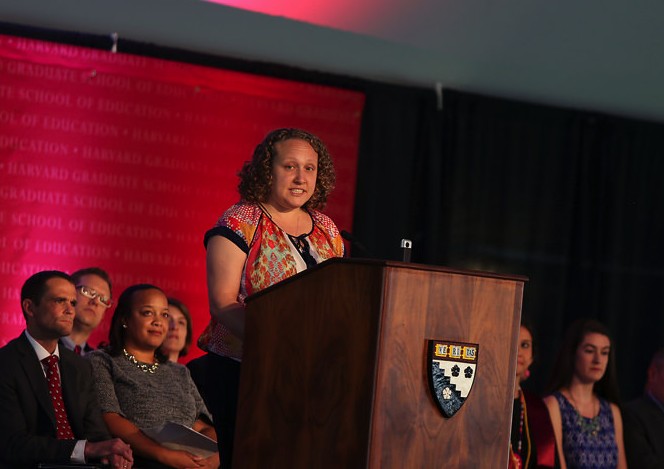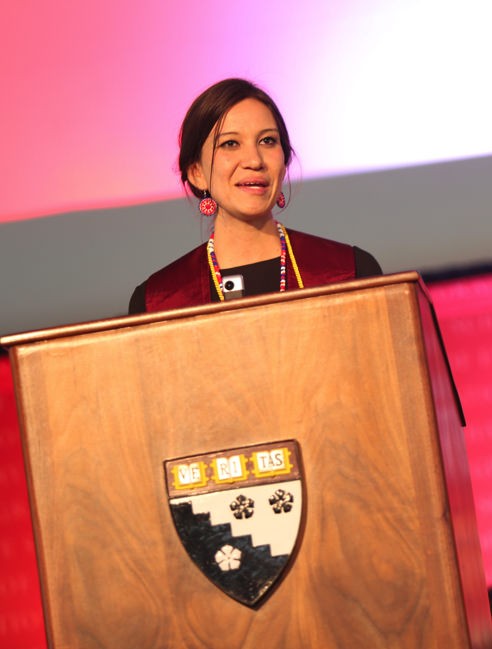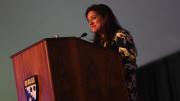On Wednesday afternoon in Radcliffe Yard, before a tent packed level full with degree candidates in the Harvard Graduate School of Education, keynote speaker Reshma Saujani, M.P.P. ’99, was telling a story about the classroom visit a few years ago that got her angry enough to launch Girls Who Code, a nonprofit that, by doing just what its name says, aims to send more women into tech.
Actually, it was more than one classroom visit—it was all of them. During a 2010 run for Congress (unsuccessful, in the end), Saujani visited lots of public schools in New York City where, she said, she saw “computer labs full of boys learning to code.” And the girls? Nowhere in sight. “I was baffled,” she said. “I mean, I knew Silicon Valley was a boys’ club, but I didn’t know it started back in high school.”
Saujani was no computer scientist herself; she was a former finance lawyer and aspiring politician, the daughter of Indian-born refugees who’d moved to the suburbs of Chicago after the dictator Idi Amin expelled them from their home in Uganda. She didn’t even know how to code, but a couple of summers after her congressional campaign, she borrowed a New York office space from a friend and the two of them spent seven weeks teaching 20 girls the basics of the skill. Since then, Girls Who Code has expanded to all 50 states. Altogether, it’s taught 40,000 middle- and high-school girls, encouraging them (with some success, Saujani said) to pursue computer science in college and beyond.

Dean James Ryan
Courtesy of Harvard Graduate School of Education
The gender gap in the tech industry is famously dismal. And in the last three decades, the numbers have gotten worse, not better. Introducing Saujani, HGSE dean James Ryan (whose own 2016 commencement address went viral, leading, this spring, to a book), told the audience that in 1984, 37 percent of all computer-science graduates were women; this year that number is 18 percent. By 2020, computing will account for 1.4 million jobs, Saujani says. American graduates are on track to fill 29 percent of those jobs; women are on track to fill 3 percent. On Wednesday, she told her audience that today’s “earth-shattering, paradigm-shifting” moment in history, driven by the blistering pace of technological innovation and on par with the Enlightenment and the Industrial Revolution, threatens to leave women behind. “The future is going to look nothing like the present.” And that future is already under way, she said. “And its leaders? Well, they don’t look like me. They look like tomorrow’s Commencement speaker”: Facebook CEO, and white man, Mark Zuckerberg.
“And I mean no shade to Zuckerberg,” Saujani quickly clarified with a grin (“Yes, you do!” came a delighted cry from somewhere in the crowd). Still, Saujani wondered, why aren’t there more women leaders in tech? Why are the numbers still so low? She thinks she knows at least part of the answer: “In our society, we train boys to be brave—to throw caution to the wind and follow their passions. And we train girls to be perfect—to please and play it safe, to follow the rules, and to always get straight As.” This is the argument of Saujani’s 2016 TED talk, now viewed more than three million times online (“Bravery, not perfection, was the key that unlocked all the doors I’ve walked through”). And it was the core of her message—a plea, really—to HGSE graduates: as educators, she said, “you…will be some of the most influential role models in a young girl’s life.…Don’t let our girls play it safe. Don’t let them limit themselves to the thing they’re best at, or the thing they think they should do. Push them to be brave. Push them to take risks. Reward them for trying.”

Gretchen Brion-Meisels
Courtesy of Harvard Gradute School of Education
Saujani’s speech followed two others in the HGSE ceremony, and themes from each resurfaced again and again throughout the afternoon: community, justice, urgency, hope, resilience. In the faculty address, lecturer Gretchen Brion-Meisels talked about the “public love” she hoped HGSE graduates would cultivate in their work. “Love is not something we typically talk about in the context of school,” she acknowledged—the word gets muddied and romanticized in popular culture and it’s hard to measure with diagnostic tools. But it’s necessary, she argued, building off stories and ideas in Troublemakers: Lessons in Freedom from Young Children at School, a book by former elementary-school teacher Carla Shalaby, Ed.D. ’14. What Brion-Meisels called “being love” is, she explained, “a deep commitment to each other’s humanity. It requires us to lead with curiosity rather than assumptions. It asks us to pause and listen between breaths. It demands we stand in solidarity with each other, even when the act of solidarity requires us to dismantle the foundations upon which we stand.” Not “sugary sweet” but fierce and rigorous, this kind of love is “not easy,” she continued, “because our world is set up to support individual success over collective well-being.…Being love requires that we redefine what it means to be successful.” Less a personal triumph than something closer to the ancient Greek concept of agape, or the Zulu humanist philosophy of ubuntu. “Love yourself,” Brion-Meisels said in closing. “Love the young folks with whom you work, love the families and communities from which they come. In the moments when it feels hardest to love, love harder.”

Megan Red Shirt-Shaw
Courtesy of Harvard Graduate School of Education
Perhaps the day’s most stirring speech came from Megan Red Shirt-Shaw, Ed.M. ’17, a member of the Oglala Sioux tribe from Pine Ridge, South Dakota, who began by acknowledging the Wampanoag and other Massachusetts tribes, on whose land, she said, “this university rests.” She recalled packing three suitcases one year ago and driving 3,000 miles from California to Cambridge to begin classes “in perfect summer sunlight,” feeling that she was carrying with her, her mother, father, sister, brother, niece—and “every native student I have loved.” The world inside her and around her had changed during her year on campus: the Dakota Access Pipeline Movement (whose protesters she knew and worked to help from Cambridge), the tumultuous American political moment, the classroom conversations that left her confused and “dreaming out” her future in new and unexpected ways. These things had rocked her. “We must root our classroom theory in reality,” she said now. Red Shirt-Shaw is a member of the Harvard student group FIERCE (Future Indigenous Educators Resisting Colonial Education), and she plans to go on to her Ph.D. in education and to work in Native American communities. “We will forward and forever commit to recognizing the potential and human spirit of every student,” she reminded her classmates, and “we will always appreciate the dreamers, the light-seekers and the activists, because in them we see ourselves.”
Red Shirt-Shaw described her spring-break trip to Canada to work on “alternative education methods” for young, homeless First Nation women—“with faces like mine”—in a program called Moving the Mountain. “Unlike my own experiences, almost every person and every system in their lives has let them down,” she said, her voice thick with emotion. And yet the women persevere. “I cried in anger for the entire flight back because I knew what I was learning here in the classroom wasn’t going to make the world better for them tomorrow.” And yet: “These young women also reminded me,” Red Shirt-Shaw said, “to remember that if they can show up to their classrooms every day by any means necessary…in faith that things for them will someday be better, we can, too.”
She closed her speech with a Lakota expression her mother had taught her: “Weksuye, ciksuye, miksuye.” It means, she said, “I remember, I remember you, please remember me.” Her voice was shaking slightly. “I want to remind you to remember,” she said. “Remember the students and teachers and classmates who built you. Carry the people next to you every day, and honor this amazing opportunity that we were so privileged to be a part of.”








